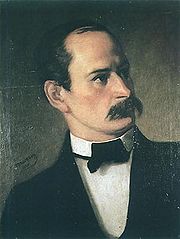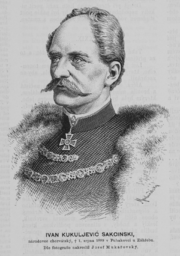
Vienna Literary Agreement
Encyclopedia
.jpg)


Croatia
Croatia , officially the Republic of Croatia , is a unitary democratic parliamentary republic in Europe at the crossroads of the Mitteleuropa, the Balkans, and the Mediterranean. Its capital and largest city is Zagreb. The country is divided into 20 counties and the city of Zagreb. Croatia covers ...
, Serbia
Serbia
Serbia , officially the Republic of Serbia , is a landlocked country located at the crossroads of Central and Southeast Europe, covering the southern part of the Carpathian basin and the central part of the Balkans...
and one from Slovenia
Slovenia
Slovenia , officially the Republic of Slovenia , is a country in Central and Southeastern Europe touching the Alps and bordering the Mediterranean. Slovenia borders Italy to the west, Croatia to the south and east, Hungary to the northeast, and Austria to the north, and also has a small portion of...
met to discuss the extent to which their literatures could be conjoined and united.
Historical context
The first half of 19th century proved to be a turning point in IllyrianIllyrian movement
The Illyrian movement , also Croatian national revival , was a cultural and political campaign with roots in the early modern period, and revived by a group of young Croatian intellectuals during the first half of 19th century, around the years of 1835–1849...
language conceptions. By that time, Illyrians held individual debates with their opponents, and Zagreb
Zagreb
Zagreb is the capital and the largest city of the Republic of Croatia. It is in the northwest of the country, along the Sava river, at the southern slopes of the Medvednica mountain. Zagreb lies at an elevation of approximately above sea level. According to the last official census, Zagreb's city...
, as a the center of Croatian cultural and literary life, served as a stronghold for their implementation and propagation. However, by that time some of the Illyrians came to realize the infeasibility of the Illyrian conceptions of language and literary unification of all South Slavs
South Slavs
The South Slavs are the southern branch of the Slavic peoples and speak South Slavic languages. Geographically, the South Slavs are native to the Balkan peninsula, the southern Pannonian Plain and the eastern Alps...
, realizing that the only real option left would be the creation of common literary language for Croats and Serbs, which have partially in common both Štokavian dialect and Ijekavian pronunciation.
The agreement
In March 1850 the meeting was organized and was attended by self-taught Serbian linguist and folklorist Vuk Stefanović KaradžićVuk Stefanovic Karadžic
Vuk Stefanović Karadžić was a Serbian philolog and linguist, the major reformer of the Serbian language, and deserves, perhaps, for his collections of songs, fairy tales, and riddles to be called the father of the study of Serbian folklore. He was the author of the first Serbian dictionary...
, his close follower Đuro Daničić, the most eminent Slavist of the period - Slovenian Franc Miklošič
Franc Miklošic
Fran Miklošič , was a Slovene philologist.-Biography:Miklošič was born in the small village of Radomerščak near the Lower Styrian town of Ljutomer, then part of the Austrian Empire....
, and Croatians were represented by Ivan Kukuljević Sakcinski
Ivan Kukuljevic Sakcinski
Ivan Kukuljević Sakcinski was a Croatian historian, politician and writer. Most famous for the first speech delivered in Croatian before the Parliament, this patriot and cultural figure did some pioneering work in Croatian historiography and bibliography...
, Dimitrije Demeter, Ivan Mažuranić
Ivan Mažuranic
Ivan Mažuranić was a Croatian poet, linguist and politician—probably the most important figure in Croatia's cultural life in the mid-19th century...
, Vinko Pacel, and Stefan Pejaković.
General guidelines for the conceived development of the common literary language for Croats and Serbs were agreed on, which were in accordance with basic Karadžić's language and orthographic premises, and that partly corresponded to those fundamental Croatian Neoštokavian pre-Illyrian literary language which Illyrian language conception suppressed at the expense of South-Slavic commonness.
The signees agreed in five points:
- They decided not to mix existing dialectDialectThe term dialect is used in two distinct ways, even by linguists. One usage refers to a variety of a language that is a characteristic of a particular group of the language's speakers. The term is applied most often to regional speech patterns, but a dialect may also be defined by other factors,...
s creating new one, and that they should, following German and Italian role-model, pick one of the peoples' dialects and select is as literary in which all books shall be written. - They unanimously accepted that the "southern dialect" should be selected for the common literary dialect for all Serbs and Croats, and they all decided to write ije where that dialect had disyllabic reflex of long jatYatYat or Jat is the thirty-second letter of the old Cyrillic alphabet. Its name in Old Church Slavonic is jěd’ or iad’ . In the common scientific Latin transliteration for old Slavic languages, the letter is represented by e with caron: .The yat represented a Common Slavic long vowel...
, and write je, e or i where the reflex is monosyllabic (i.e. whether Ijekavian, Ekavian or Ikavian). In order to know precisely where the aforementioned dialect has two syllables and where only one, Vuk Karadžić was asked to write "general rules for the southern dialect" (opća pravila za južno narječje) on that issue which he did. - They agreed that Serbian and Montenegrin writers should write h (/x/) everywhere it belongs etymologically, as the Croatian writers do and some in southern regions speak.
- They all agreed that the genitiveGenitive caseIn grammar, genitive is the grammatical case that marks a noun as modifying another noun...
pluralsGrammatical numberIn linguistics, grammatical number is a grammatical category of nouns, pronouns, and adjective and verb agreement that expresses count distinctions ....
of nouns and adjectives should not have h at the end because it doesn't belong there by etymology, because it is not necessary as a distinction towards other cases in the paradigm and because lots of writers don't write it at all. - It was agreed that before syllabic /r/ one should not write neither a or e as some Croatian writers do, but only r, such as in the word prst ('finger'), because that's the way people speak and most other writers write.
During the second half of the 19th century these conclusions were called in the public as "declaration" (objava) or "statement" (izjava). The title Vienna Literary Agreement (/Бечки књижевни договор) dates from the 20th century.
Implications and influence
The Vienna Literary Agreement was variously interpreted and referred to throughout the history of Croats and Serbs. During the history of the YugoslaviaYugoslavia
Yugoslavia refers to three political entities that existed successively on the western part of the Balkans during most of the 20th century....
s, especially the Socialist Federal Republic of Yugoslavia
Socialist Federal Republic of Yugoslavia
The Socialist Federal Republic of Yugoslavia was the Yugoslav state that existed from the abolition of the Yugoslav monarchy until it was dissolved in 1992 amid the Yugoslav Wars. It was a socialist state and a federation made up of six socialist republics: Bosnia and Herzegovina, Croatia,...
, the official doctrine was that the agreement set firm grounds for the final codification of Serbo-Croatian
Serbo-Croatian
Serbo-Croatian or Serbo-Croat, less commonly Bosnian/Croatian/Serbian , is a South Slavic language with multiple standards and the primary language of Serbia, Croatia, Bosnia and Herzegovina, and Montenegro...
language that soon followed. With the advent of standard
Standard language
A standard language is a language variety used by a group of people in their public discourse. Alternatively, varieties become standard by undergoing a process of standardization, during which it is organized for description in grammars and dictionaries and encoded in such reference works...
Bosnian
Bosnian language
Bosnian is a South Slavic language, spoken by Bosniaks. As a standardized form of the Shtokavian dialect, it is one of the three official languages of Bosnia and Herzegovina....
, Croatian
Croatian language
Croatian is the collective name for the standard language and dialects spoken by Croats, principally in Croatia, Bosnia and Herzegovina, the Serbian province of Vojvodina and other neighbouring countries...
and Serbian
Serbian language
Serbian is a form of Serbo-Croatian, a South Slavic language, spoken by Serbs in Serbia, Bosnia and Herzegovina, Montenegro, Croatia and neighbouring countries....
in the 1990s, criticism emerged on the relevance of the agreement.
For example, according to , the event had no critical influence for the Croatian cultural milieu, but has "managed to indicate developmental tendencies that in the formation of Croatian literary language which won by the end of the century". Malić argues that it was only during the 20th century, in the framework of "unitarist language conceptions and language policy", that the meeting has been given critical influence for the formation of common Croatian and Serbian literary language.
Since the agreement was not officially organized, no one was bound by it, and was thus not initially accepted neither by Croatian nor by Serbian press. Croatia still had very live Illyrian language conception, and conservative Serbian cultural milieu was not ready to accept Karadžić's views of folk language of being literary. It was only in 1868 that his reform was accepted in Serbia, and not to the complete extent (Ekavian pronunciation was accepted as standard, not Ijekavian), and urban colloquial speech was silently given great influence to form standard language.

